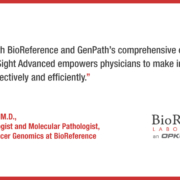September is National Ovarian Cancer Awareness Month
September is National Ovarian Cancer Awareness month and an important time to raise awareness of the most deadly gynecological cancer in the U.S. Early signs and symptoms of ovarian cancer are often missed, leading to most ovarian cancers being diagnosed at a late stage. In these cases, the mortality rate is often 70% or more1.
Ovarian cancer is often referred to as a “silent killer” but contrary to this belief, 95% of women with ovarian cancer do report symptoms prior to diagnosis2. These symptoms may be missed or ignored because they can be vague and not exclusively gynecologic.
What are the symptoms?
Some symptoms of ovarian cancer include:
- Abdominal bloating, increased girth
- Fatigue
- Gastrointestinal disturbances
- Urinary symptoms
- Abdominal/Pelvic pain (>12 days per month)
- Menstrual irregularities3
How does a patient know if these symptoms are concerning?
The key feature to look for is persistence of symptoms. Women with ovarian cancer report that symptoms are persistent and represent a change from normal for their bodies3.
According to the Society of Gynecologic Oncologists, “Women who have these symptoms almost daily for more than a few weeks should see their doctor, preferably a gynecologist.” Prompt evaluation of symptoms may lead to detection at an earlier stage of disease4. Earlier detection of ovarian cancer leads to better outcomes1.
What are your next steps?
Through a combination of history, physical examination, blood tests, and ultrasound, your healthcare provider can determine if there is a concern for ovarian cancer and discuss treatment options that best fit your needs.
Genetic Testing For Hereditary Breast and Ovarian Cancer
GenPath® Women’s Health, a division of BioReference®, offers testing for patients at high risk of Ovarian Cancer based on family and personal history. Genetic testing is recommended for patients with a strong family history, a person already diagnosed with cancer, or for family members of a person who has an inherited gene mutation that increases cancer risk4. Speak with your healthcare provider to learn more and determine if Hereditary Cancer testing is right for you.
References
- https://seer.cancer.gov/statfacts/html/ovary.html
- Goff, B. A., Mandel, L. S., Melancon, C. H., & Muntz, H. G. (2004). Frequency of symptoms of ovarian cancer in women presenting to primary care clinics. Jama, 291(22), 2705-2712.
- Committee Opinion No. 716: The Role of the Obstetrician-Gynecologist in the Early Detection of Epithelial Ovarian Cancer in Women at Average Risk. Obstet Gynecol. 2017 Sep;130(3):e146-e149. doi: 10.1097/AOG.0000000000002299. PMID: 28832487.
- https://www.cancer.org/healthy/cancer-causes/genetics/genetic-testing-for-cancer-risk/understanding-genetic-testing-for-cancer.html









